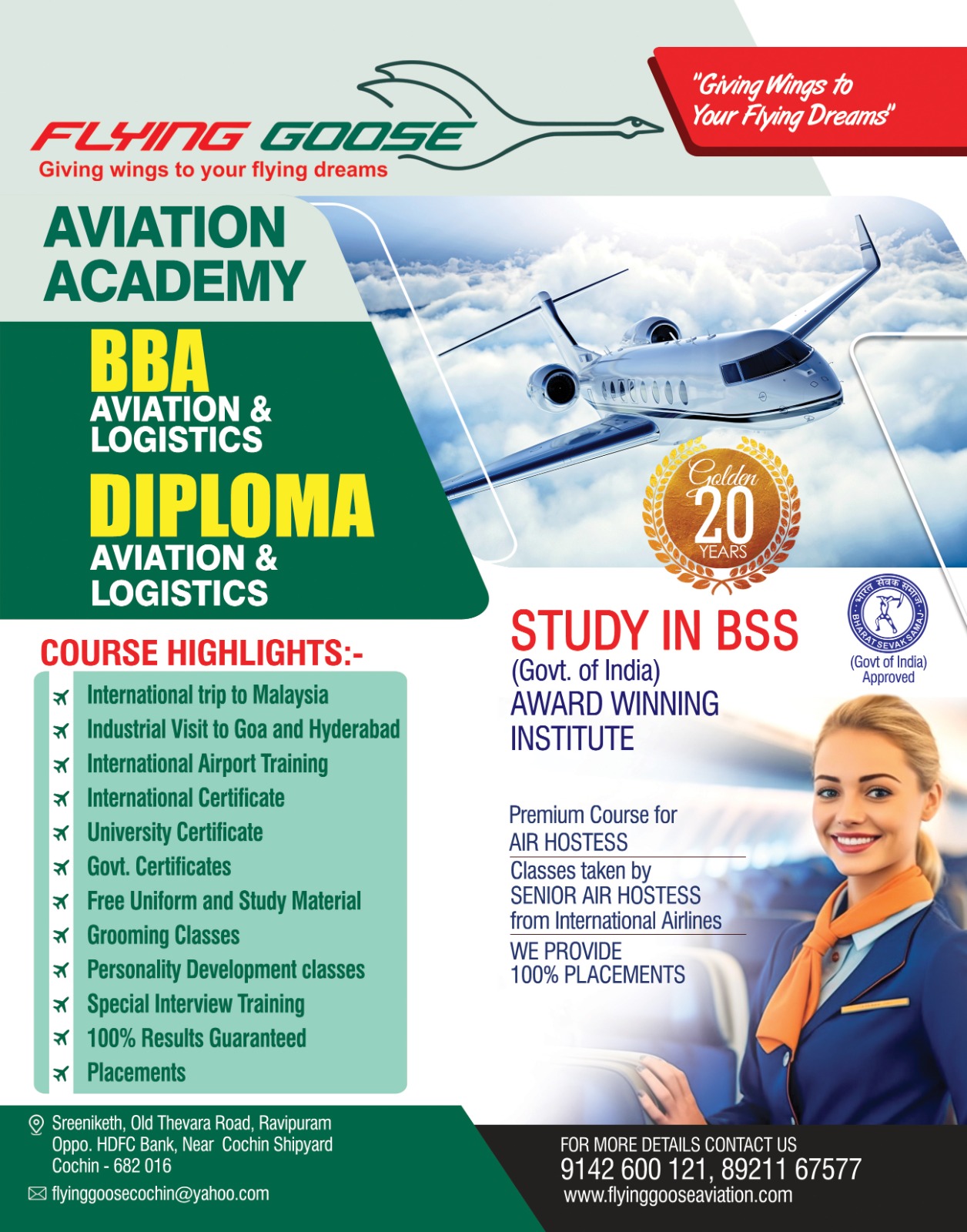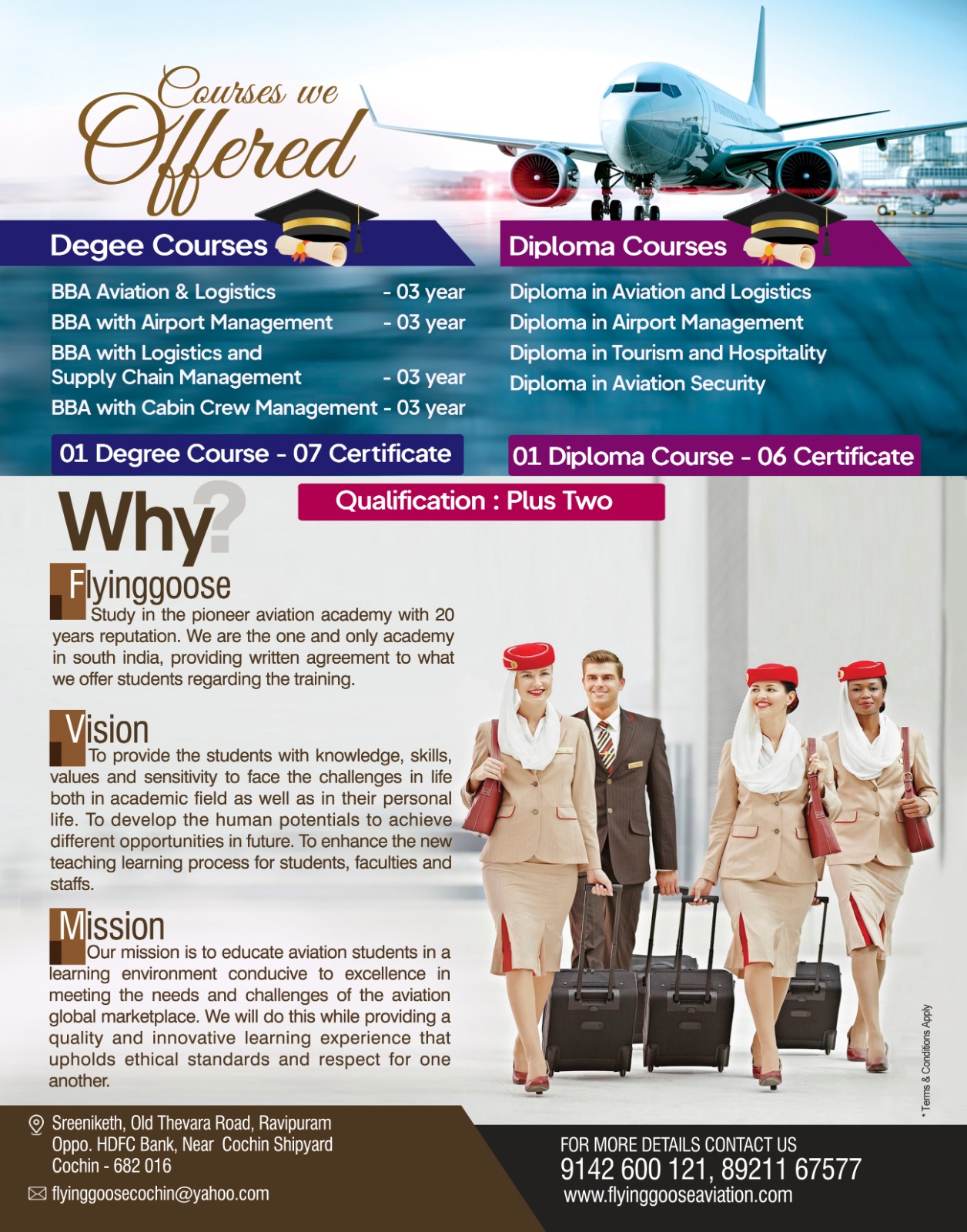Flying Goose Aviation Academy
Ravipuram - Ernakulam
Products & Services:
Flying Goose Aviation Academy, Ravipuram, Ernakulam, Reviews, Contact number, Phone number, Address, More..
Since : 2004
Ravipuram - Ernakulam
Products & Services:
Flying Goose Aviation Academy, Ravipuram, Ernakulam, Reviews, Contact number, Phone number, Address, More..
Since : 2004
The aviation industry is one of the most dynamic and fast-paced sectors, requiring highly skilled professionals to ensure the safety and comfort of passengers. Air hostesses and cabin crew members play a crucial role in this industry, making specialized training essential for those aspiring to join this field. This article delves into what specialized training for air hostess cabin crew entails and explores the availability and expectations of such training programs in Ernakulam.
Specialized training for air hostess cabin crew encompasses a comprehensive curriculum designed to equip candidates with the necessary skills and knowledge to excel in their roles. This training covers various aspects, including safety procedures, customer service, communication skills, and grooming standards. Trainees learn how to handle emergency situations, provide exceptional in-flight service, and ensure passengers' well-being throughout the flight. The training also includes practical sessions in mock aircraft settings, allowing candidates to gain hands-on experience.
Key components of specialized training include:
Ernakulam, a bustling city in Kerala, is home to several reputable institutions offering specialized training for air hostess cabin crew. These training centers are equipped with modern facilities and experienced trainers, providing a conducive environment for learning and development.
Prominent training institutes in Ernakulam include:
These institutes offer various course durations, from short-term certificate programs to extensive diploma courses, catering to the diverse needs of aspiring cabin crew members.
Customers expect a thorough and well-rounded curriculum that covers all aspects of cabin crew responsibilities. This includes safety training, customer service, first aid, and emergency protocols. They look for programs that offer both theoretical knowledge and practical skills to ensure they are fully prepared for the challenges of the job.
One of the key expectations is that the training is delivered by experienced and knowledgeable trainers. Customers prefer institutes that employ instructors with extensive backgrounds in aviation, ensuring they receive insights from professionals who have firsthand experience in the industry.
Training centers with modern facilities and advanced training equipment are highly sought after. Mock aircraft cabins, safety equipment, and interactive training tools enhance the learning experience, making it more engaging and effective.
Job placement support is a significant factor for many customers. They expect training institutes to provide assistance with job placements, internships, and connections with leading airlines. Institutes with strong industry ties and a track record of successful placements are particularly favored.
Customers appreciate flexibility in course schedules and formats. Options for full-time, part-time, and weekend classes allow individuals to choose programs that fit their personal and professional commitments. Additionally, online learning modules have become increasingly popular, offering convenience without compromising on quality.
Typically, candidates need to have completed their high school education (12th grade). They should meet certain physical and medical standards, including height, weight, and vision requirements. Good communication skills and a pleasing personality are also essential.
The duration of training programs can vary. Short-term certificate courses may last 3 to 6 months, while more comprehensive diploma programs can extend up to 12 months. Some institutes also offer fast-track courses for quicker certification.
The cost of training programs can range from INR 50,000 to INR 2,00,000, depending on the institute and the duration of the course. Some institutes offer installment payment options and scholarships to help manage the financial burden.
Yes, many reputed training institutes in Ernakulam offer placement assistance as part of their program. They have tie-ups with leading airlines and provide support in securing job interviews and placements for their graduates.
Most training programs accept candidates between the ages of 18 and 27. However, the age requirements can vary by institute and airline. It's important to check the specific eligibility criteria of the institute you are interested in.
Training programs emphasize a range of skills, including safety procedures, first aid, customer service, communication, grooming, and interpersonal skills. Practical training sessions in simulated aircraft settings are also a key component.
Absolutely. Cabin crew training is open to both male and female candidates. Many institutes offer courses tailored to both genders, preparing them for roles as flight attendants or stewards.
Graduates can start their careers as cabin crew members and, with experience, can advance to positions such as senior flight attendants, cabin crew supervisors, and in-flight managers. There are also opportunities for roles in ground operations and training.
Proficiency in English is crucial as it is the primary language of communication in the aviation industry. Knowledge of additional languages can be an added advantage, especially for international airlines.
Yes, candidates must meet certain physical fitness standards, including height and weight criteria, good vision, and overall health. These standards ensure that cabin crew members can perform their duties effectively and handle emergency situations.

Ernakulam, Ravipuram

Ernakulam, Ravipuram